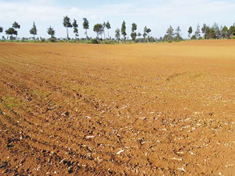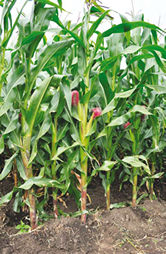Maize Production: Enhancing Soil Fertility for Greater Productivity
 The staple food crops in Kenya include maize, beans, rice, potatoes and sorghum. The yields of food crops per acre are on the decline due to adverse effects of climate change, low adoption of quality farm inputs and continuous farming without adequate soil nutrients replenishment. This calls for better soil management practices through soil investigations that provide farmers with soil amendment and management solutions that not only increases crop productivity but also conserve the environment.
The staple food crops in Kenya include maize, beans, rice, potatoes and sorghum. The yields of food crops per acre are on the decline due to adverse effects of climate change, low adoption of quality farm inputs and continuous farming without adequate soil nutrients replenishment. This calls for better soil management practices through soil investigations that provide farmers with soil amendment and management solutions that not only increases crop productivity but also conserve the environment.
Optimal Conditions for Maize Growth
Maize can be grown on a wide range of soils but performs best on well-drained, well aerated and deep soils containing adequate organic matter content and well supplied with available nutrients. High yields of maize results in heavy drain on soil nutrients and therefore requires regular replenishment with soil nutrients to replace nutrients taken up after every harvest. To sustain yields at a certain level, nutrients out of soil must always be almost equal to nutrients applied within a growing period taking into consideration nutrient losses through harvested materials, leaching, volatilization, and erosion. For optimum production, factors such as soil moisture, temperature, pests and diseases, weed control, and soil chemical and physical conditions must be taken into consideration.
 For maximum yield and income, the farmer must ensure they maximise on the good practices and avoid cost cutting. Maximum recommended fertilizer, certified seeds, good land preparations and timely agricultural practices. (land prep, planting, weeding, top dressing, and Harvesting). Farmers should also ensure the storage of the produce is suitable and dried to the recommended moisture level and coated with insecticide to prevent borers from destroying the grain. This will enable them hold on to their maize until prices are suitable to dispose of their produce. Avoid selling to the middlemen and form cooperatives which can be their vehicle to bargaining.
For maximum yield and income, the farmer must ensure they maximise on the good practices and avoid cost cutting. Maximum recommended fertilizer, certified seeds, good land preparations and timely agricultural practices. (land prep, planting, weeding, top dressing, and Harvesting). Farmers should also ensure the storage of the produce is suitable and dried to the recommended moisture level and coated with insecticide to prevent borers from destroying the grain. This will enable them hold on to their maize until prices are suitable to dispose of their produce. Avoid selling to the middlemen and form cooperatives which can be their vehicle to bargaining.